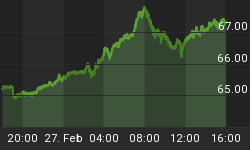The following is excerpted from a commentary originally posted at www.speculative-investor.com on 4th April 2013.
Inflation-deflation debates often involve arguing over which is more likely: deflation or hyperinflation. Since both deflation and hyperinflation are extremely unlikely over what most people would consider to be a normal investment timeframe, these debates are effectively arguments about which of two remote possibilities is the least remote. The more useful debate would start with the question: Deflation or more of the same (plenty of inflation, but not hyperinflation)?
Framing the inflation-deflation debate as deflation versus hyperinflation is done more often by 'deflationists' (people who expect deflation) than 'inflationists' (people who expect inflation). It's a type of "straw man" argument, in that it misrepresents a forecast for more inflation as a forecast for hyperinflation in order to make the forecast easier to discredit. After all, it is difficult to argue that more inflation is unlikely in the US when the US has experienced inflation and nothing but inflation since 1933. It is much easier to argue that hyperinflation is unlikely, because hyperinflation would require a dramatic shift in both monetary policy and mass psychology.
To be fair, we'll note that some inflationists have made the mistake of arguing that hyperinflation is not only a long-term inevitability, but likely to happen in the near future. For example, some inflationists have shown charts of what happened in Germany during the early-1920s and implied that something similar was a realistic possibility for the US within the coming year or two. In doing so they gave the deflationists a helping hand, because a bad argument in favour of an idea can be more damaging to the credibility of the idea than a good argument against it.
The deflationists point at the forecasters of near-term US hyperinflation and exclaim: "The Fed has printed heaps of money, but there is no sign of the hyperinflation you've been predicting. You have obviously been wrong!" These are true words, but, as mentioned above, deflationists often distort the truth by insinuating that ALL inflationists have been predicting imminent hyperinflation.
Unfortunately, while the deflationists are generally quick to take the hyperinflation forecasters to task, they are generally slow to explain why their own forecasts have been completely wrong. We want the deflationists who told us, back in 2008-2009, that the Fed would be powerless to prevent deflation, to explain why there has been so much inflation -- regardless of how the word "inflation" is defined -- in the US over the past four years.
As far as we can tell, the deflation theory that became very popular a few years ago was largely based on the fact that the amount of debt was huge relative to the amount of money. It wasn't a good theory then and it is not a good theory now, because it confuses/conflates money and debt. Back in late-2008 and early-2009 you needed to understand the difference between money and debt to know why there would be no deflation in the US if the Fed continued the aggressive money-creation program that began in September of 2008, but as time went by it became increasingly obvious just by observing price changes that there was something fatally wrong with the popular deflation theory. The question that deflationists need to answer now is: with the theory that the Fed either couldn't or wouldn't create inflation having been thoroughly debunked by events, what is the basis of your current deflation forecast?
Our view is that the US will eventually experience hyperinflation, but there is not a realistic chance of it happening within the next two years (and there is no point looking further ahead than two years). This has been our view since the inauguration of the TSI subscription service more than 12 years ago. While deflation has a better chance than hyperinflation of happening within the next two years, its probability is also extremely low.
Over the next two years there is likely to be no deflation and no hyperinflation, just more inflation of both the monetary kind and the price kind. There is also likely to be another deflation scare, which we define as a period when rapid monetary inflation occurs in parallel with rising irrational fear of deflation.
We aren't offering a free trial subscription at this time, but free samples of our work (excerpts from our regular commentaries) can be viewed at: http://www.speculative-investor.com/new/freesamples.html















